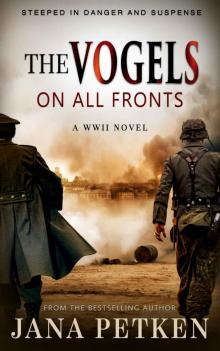- Home
- Jana Petken
The German Half-Bloods (The Half-Bloods Trilogy Book 1) Page 30
The German Half-Bloods (The Half-Bloods Trilogy Book 1) Read online
Page 30
The two men shook hands. Paul looked at Max’s face, lips set tight and moist eyes displaying his emotions. “I love you, mate.”
Max drew himself up to his full height, took a deep breath and said, “I’ll miss you to my bones, Paulie.”
Chapter Forty-Four
Paul refused his father’s offer of a lift and instead took the tram to Berlin’s city centre where the SS Headquarters on Prinz-Albrecht-Strasse were situated. Max had suggested earlier that Paul do that to obtain a tram ticket proving he’d been in Berlin at a specific time on the day of Leitner’s death. The more alibis he had, the better, Max had thought.
On the journey, Paul practised answering the questions he imagined he’d eventually be asked about Leitner. He wouldn’t know until he got to the headquarters if Leitner’s burnt out car had already been found and a communication about the incident had reached the SS and Abwehr. He didn’t know if the authorities would declare Leitner’s death an accident or immediately suspect foul play, and more importantly if the SS Medical Corps knew he was a spy, or even knew of him. A myriad of scenarios drove his thoughts deeper and deeper into a minefield of possible cock-ups. One wrong word or facial expression and he’d be faced with a slew of questions he’d not even thought of. Total ignorance might be the best way to go, he thought. He knew nothing, nothing about who the Hauptsturmführer worked for.
When he reached his destination on Prinz-Albrecht-Strasse, he showed his identity papers to the SS guards at the doors and then walked into the concrete monstrosity of a building, known for almost a year as the Reich’s Main Security Office. He paused in the lobby to get his bearings, turning a full circle to take a lingering look at his surroundings, and was flabbergasted at the amount of foot traffic he saw. Gestapo, SS soldiers, officers, civilians and visiting dignitaries with their security entourages waddling behind them packed the hallways like travellers at a busy railway station. If he didn’t hate the Nazis to distraction, he might be feeling pride right now instead of shame and anger.
The ugly, yet impressive building was the nucleus of the Reich’s elite forces. One night at dinner, Leitner had told him that the whole set up in Prinz-Albrecht-Strasse had been Heinrich Himmler’s idea, and that when it was up and running, he’d placed it under the command of Reinhard Heydrich who ran it for the whole of Germany and occupied Europe.
Paul approached the centre of the lobby where a command post manned by SS soldiers and three females in Wehrmacht uniforms was situated. He assumed they were there to check IDs and direct or escort visitors to the different sections in the building.
He studied the goings on at the post for a few minutes and noted that people were queuing up in front of the counter. He walked towards it and jumped the line to the sound of shouts and insults. “I need information,” he said in a sharp tone of voice to one of the male soldiers. “I am Lieutenant Paul Vogel of the SS Medical Corps. I’m waiting for Hauptsturmführer August Leitner. Have you seen him?” Paul, pleased to see he’d got the attention of the females and one of the soldiers with his haughty attitude, demanded again, “Well, has he arrived or not?”
One of the women behind the high counter glared at Paul, her expression just as stuck-up as his had been. “Have you any idea how many people come and go through these halls every day?” she shouted back. “And do you not see there’s a queue? Please, go to the back of it. Good manners cost nothing.”
“I only want to know about one person – Hauptsturmführer Leitner.”
“Why don’t you take a seat, sir,” an SS rifleman said, ushering Paul away. “If Hauptsturmführer Leitner comes to the desk and asks for you, we’ll let you know.”
Paul stormed off to eventually sit in an uncomfortable chair near the counter. He was in position.
For over an hour, Paul watched people come and go until his eyelids drooped and ultimately closed. Sucked straight into what he could only describe later as a half-sleep, half-daydream, he saw himself armed with a machine gun, climbing the impressive staircase to kill Himmler. All he could think about in that dream was that Himmler’s presence on the top floor had made this building the default headquarters for the entire SS, and if he were to kill him, things might fall apart…
“Untersturmführer … Untersturmführer!”
Paul woke up with a start and straightened himself. He was groggy and still coming out of the spectacular killing spree he’d just lived through in his mind. “What?” he muttered.
“You have been sitting here for almost two hours, Untersturmführer. Do you have an appointment to see someone in this building or not?”
Paul stood, straightened his jacket and put on his cap. “Almost two hours? My God, it seemed like five minutes.”
“Where are you meant to be going?”
“The Medical Corps section on the second floor.”
“I see. Wait here, sir.”
When the soldier returned, Paul asked, “Shall I go up.”
“Yes, Untersturmführer, but not to the second floor. It seems Kriminaldirektor Biermann of the Gestapo is expecting you.”
Surprised to be seeing a Gestapo Major, Paul followed the soldier to the third-floor administration department, a massive open space housing secretaries and uniformed Gestapo personnel who were making a deafening noise as their fingers battered the typewriter keys in unison.
“Go to that secretary over there and ask for the Kriminaldirektor,” said Paul’s escort.
After an agonising ten-minute wait imagining the very worst developments possible, Paul was eventually shown into Kriminaldirektor Biermann’s office. The officer in civilian clothing was familiar to Paul. He couldn’t place where or when he’d met the Major, but he wasn’t a stranger.
“Paul Vogel. Look at you.” Freddie Biermann smiled. “The last time I saw you, you were just about to go off to university. You probably don’t remember me. I’m a close friend of your father’s.”
Paul gave him a polite smile but still couldn’t recall where or when he’d met the man.
“If I told you how long I’ve known Dieter Vogel, and what we used to get up to, you wouldn’t believe me.”
Paul’s eyes widened in recognition as a memory surfaced. It was Max’s and his nineteenth birthday party, and their father had invited his friends and business associates to the house. He couldn’t recall the Kriminaldirektor by his name, for his father probably wouldn’t have bothered to introduce the man to his sons, but his face was becoming even more familiar. “I do remember you, Kriminaldirektor. If I’m not mistaken, you came to my father’s house once.”
Biermann laughed. “I have been to your house countless times, but you were never at home. On the one occasion we did meet, you and your brother Max were about to go off into the world of academia. Time is like a flash of lightning, Paul, it strikes and then it’s gone.”
“How long have you known my father, sir?”
“It seems like only last week that we became friends. You know, I’d like to think I was the reason your father started his company,” said Biermann, once Paul was seated. “We served together in the First World War.” Biermann’s eyes began to wander, as though he’d lost focus. “You know, Paul, I remember when that term for our bloody times was first used. It was sometime in the September of 1914. A biologist and philosopher – a wonderful philosopher, named Ernst Haeckel, claimed there was no doubt that the course and character of the feared European War would become the First World War in the full sense of the word. He was right. I wonder what he’d call this new conflict were he still alive?”
Coming back to the present, Biermann carried on, “Don’t mind me, Paul. My mind often takes me back to those terrible times. It’s like a door that never completely closes. The past for me is always ajar, it seems.”
“You and my father fought together?”
“Oh, yes, we did that. I was a young stretcher bearer in those days, complaining to your papa about the decrepit medical equipment being used in the trenches, and Dieter, who was also of
ten on stretcher-bearer duties, used to say, ‘Ach, Freddie, it’s a crime. Our injured soldiers deserve better. I might do something about this when the war’s over.’ As if he thought it would be easy to start a company when he was as poor as I was in those days.”
“And yet he did,” Paul smiled.
“He did indeed. Your father is a very clever man, Paul.” Biermann offered Paul a cigarette, and when Paul declined, he said, “I was surprised to see him here the other day, delighted, but surprised. He’s never been to my office before, never once asked a single favour of me. But, he told me you’re unhappy at Brandenburg and opened my eyes to a few things going on in that hospital of yours.”
Paul’s heart was thumping like galloping horses’ hooves. Was Biermann talking about the gassings, or about a person? Choosing caution over curiosity, he said, “I appreciate everything Herr Rudolph has done for me at Brandenburg, sir, but I’m desperate to expand my knowledge as any medical intern would be. I understand that these are trying times and we’re at war, but I can see no better place to gain experience than on the front lines, or here at one of the hospitals treating our soldiers when they’ve been wounded. I suppose my father thought you might understand my feelings…”
“I do. I do, Paul, and I agree with you. The decision, however, must be up to your superior SS officer in Brandenburg.” Bierman’s eyes bore into Paul. “Who is he?”
“Hauptsturmführer Leitner – August Leitner – I was supposed to meet him here this morning, but he didn’t show up.”
Biermann flicked through some files and then, seemingly incapable of concealing his fury, he thumped his fist on the table. “All right, no more pretence. I’ll be honest, Paul, I already knew his name. What do you know about the man?”
“Nothing, apart from his rank, and that he’s a hard taskmaster.”
“Have you ever seen him treat a patient; pick up a scalpel or needle?”
Paul looked mystified. “No, sir, I haven’t.”
“Your father informed me that he recruited you for the SS.”
“Yes, sir.”
“Well, Paul, it seems your Hauptsturmführer Leitner isn’t who he claims to be.”
Paul’s mouth opened and closed in feigned surprise. “I don’t understand…”
“No, you don’t, and that’s what makes this so damned wrong,” Biermann paused, his eyes scrutinising Paul’s as though searching for something.
Paul needed to know what Biermann knew, and trying his luck he said, “I was waiting for two hours downstairs for the Hauptsturmführer. Do you think I should stay here until he arrives? He told me I had to sign some important SS documents…”
“He duped you,” Biermann interrupted. “You signed an SS application form, that’s all. Your enlistment hasn’t even been approved yet. I couldn’t believe it when your father told me. It’s an outrageous fraud to put an SS uniform on someone who hasn’t even taken the loyalty oath or been through basic training. Didn’t you think to enquire about those procedures?”
Paul squirmed in his seat, shocked and worried about where this was going. “Hauptsturmführer Leitner led me to believe that I would be signing official papers here today. Who am I to question a senior doctor and officer?” he responded calmly. “Are you saying, sir, that I shouldn’t be wearing this uniform at all? The tailor insisted on sewing medals on it, on Leitner’s orders – or so I presumed…” Paul let his words hang in the air. He could hardly contain his satisfaction.
Biermann shook his head in disgust. “Wait ‘til I get my hands on Leitner – that damn Abwehr sticking its nose in as usual, going over everyone’s heads and damning the consequences…” Bierman stopped short, clearing his throat in embarrassment. “You leave the Hauptsturmführer to me, Paul. This has been a misunderstanding between departments. A huge misunderstanding. Herr Rudolph and I will clear this up.”
“Thank you, sir.”
“Do you want to join the SS?”
Paul’s heart was thumping. Biermann had said, do you want to, not did you want to, signifying that he was possibly still a civilian. “No, I don’t. I’m not averse to joining the Wehrmacht if my services are required or remaining a civilian doctor in service to wounded soldiers at home, but I never wanted to enlist in the SS, sir, never.”
“I see.”
Biermann lifted the telephone off its cradle, and Paul felt a surge of optimism that he’d not had for a very long time. Anywhere, anything would be better than returning to Brandenburg, he thought. He sat back in the chair and let out a quiet yet gratifying breath. His father’s work was done, and now his fate was in Biermann’s hands.
“… I see … when did this happen … yes, I understand … yes, Paul Vogel … Vogel.” Biermann frowned as he repeated I see to someone on the other end of the telephone. “Yes … please do that.”
When he hung up, Biermann stood up, clenched his fists, and went to the door. “I’m sorry, Paul, we’ll have to cut this short. I have an urgent matter to attend to. What are your duties at the hospital this evening?”
“I have none. I was to have dinner with Hauptsturmführer Leitner in Berlin after our meetings here,” Paul lied through his teeth.
Biermann was thoughtful, but he also looked furious. “You can’t go back to Brandenburg as a civilian, and you can’t wear the uniform,” he eventually said. “Go home to your father. You won’t be returning to Brandenburg except to pick up your belongings and a reference from Rudolph – we can’t have confusion among the staff about whether you’re a civilian or an SS officer. I’ll come by your house tomorrow evening, and hopefully, I’ll have answers for you.”
Paul stood, and unable to believe his luck said, “Just so I’m completely clear about this, sir, does this mean I’m still a civilian?”
“Yes. I’ll be honest with you, Paul, I can’t believe your father didn’t question the speed in which you put on that uniform. I’m sorry this has happened to you. I’ll make sure you don’t have to deal with Hauptsturmführer Leitner again.”
Paul’s knees were trembling as he stood; he could only imagine what the Kriminaldirektor’s urgent business might be. He’d apparently found out that Leitner was a spy, not a doctor, for he’d mentioned the Abwehr, but had he also just been told that Leitner was dead? “Thank you, sir, I appreciate you seeing me – how did you know I was here?”
“I saw you in the lobby sleeping like a baby.”
Paul left the building and hurried along the street. He was furious about Dieter’s delayed reaction to his posting to Brandenburg. It was evident from the meeting with Biermann that his papa could have asked for that favour months ago and saved a lot of grief for his twin sons. Max might not even have had to risk his life by coming to Germany had Brandenburg been out of the picture, and neither of them would have witnessed events that would haunt them forever. Their father had let them both down in a spectacular way, and he wanted answers.
Chapter Forty-Five
Dieter, already at home when Paul arrived, was sitting at the kitchen table. The fury on his face reminded Paul of Freddie Biermann’s an hour earlier.
“What’s happened,” Paul asked, joining Dieter at the table.
“Rudolph has just been on the telephone. He thinks we had something to do with Leitner’s death.”
“Why would he suspect us?”
“Leitner went back to Rudolph’s office this morning after I left. He wanted to know where I was going. The bastard was probably waiting for me to come out of the doctor’s residence with you … Max.”
“Rudolph is surmising. He has no proof,” Paul said.
“No, but one wrong word from him and we’ll both be dragged into an investigation.” Dieter waved his hand. “Ach, pay no heed to me. I’m not too worried about Rudolph. Freddie Biermann telephoned five minutes before you arrived. He told me that Leitner had died in a car accident. I didn’t ask, but I got the impression that there won’t be an inquiry into the crash.”
Paul let out a long sigh of relief. “Tha
nk God. Does the Kriminaldirektor know we saw Leitner at the Oro Inn this morning?”
“Yes, I was honest with him. I said the Hauptsturmführer offered to take you to Berlin for a meeting, but you decided to travel back with me instead. I also told him that Leitner left the Inn quite a while before we did. I phrased it exactly as Max instructed us to do.”
Dieter squeezed his eyes shut and wrung his hands together, a nervous gesture he was known for. Paul, quick to see that his father was on the verge of tears, placed his hand over his father’s and asked, “Something else is bothering you. I saw it on your face when I walked in. What are you not telling me?”
Dieter withdrew his hands and cleared his throat. “Your brother Wilmot has received an indeterminate prison sentence in Dachau for attempting to kill another SS rifleman. One of the reasons I went to Rudolph’s office this morning was to persuade him to use his influence to get Willie out.”
Paul felt as though his lungs were being crushed. His eyes welled up, and a throaty sob tore from his throat. He covered his face with his hands and took deep breaths, in and out, in and out. A week earlier, he’d overheard that SS traitors were being sent to a special prison camp inside Dachau, and that the incarcerated soldiers were being treated worse than any other prisoners, including Jews. He was devastated, but he was also angry with his hot-headed brother. “Stupid bugger … reckless, foolish idiot … when will he learn to control that temper of his? Jesus, Willie … does Mother know?”
“Yes.”
“Why didn’t you tell me? Haven’t there been enough secrets between us.”
“I planned to show you the letter, but then Max turned up and we had to contend with Leitner, and…”
“Don’t bother, Father,” Paul dismissed his excuses. “Will Rudolph help Willie?”
“I don’t know. I blackmailed him. I had him up against the wall, but that was before we murdered Leitner.”
Paul gaped at Dieter who had casually said the word blackmail as though he was all too familiar with the term. Out of his curiosity, he asked, “What information do you have on Direktor Rudolph?”

 Blood Moon
Blood Moon The Guardian of Secrets and Her Deathly Pact
The Guardian of Secrets and Her Deathly Pact Dark Shadows
Dark Shadows The German Half-Bloods (The Half-Bloods Trilogy Book 1)
The German Half-Bloods (The Half-Bloods Trilogy Book 1) Swearing Allegiance (The Carmody Saga Book 1)
Swearing Allegiance (The Carmody Saga Book 1) The Errant Flock
The Errant Flock The Vogels: On All Fronts (The Half-Bloods Trilogy Book 2)
The Vogels: On All Fronts (The Half-Bloods Trilogy Book 2) The Guardian of Secrets
The Guardian of Secrets Before The Brightest Dawn (The Half-Bloods Trilogy Book 3)
Before The Brightest Dawn (The Half-Bloods Trilogy Book 3) Blood Moon (The Mercy Carver Series Book 2)
Blood Moon (The Mercy Carver Series Book 2) Dark Shadows (The Mercy Carver Series Book 1)
Dark Shadows (The Mercy Carver Series Book 1)